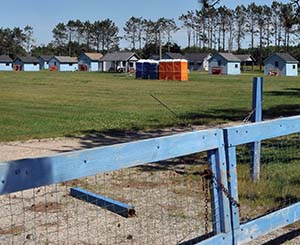 |
 |
| current issue |  |
past issues |  |
send a letter/news |  |
address update |  |
advertise |  |
about us |  |
alumni home |
Pride and Prejudice
Page 2 of 3
Previous | Next
The letter offended local Somalis, who accused the mayor of bigotry. The mayor's defenders accused the Somalis of trying to take over their city. When a white supremacist group showed up, anti-hate activists shouted them down. The national media captured it all. In contrast, the media had come to Milbridge to showcase the remarkable absence of shouting and demonstrating. In 2006, a Washington Post reporter juxtaposed "the placid coexistence" of immigrants and locals in Milbridge against the divisive immigration debate in Washington. Perhaps in an area of Maine this removed, the reporter mused, "people don't get excited about anything." Silence does not necessarily equal acceptance, however. And soon enough, it was obvious that one had been confused with the other. Within a couple of years of the Post article, Milbridge had divided in two. On one side were those who were supportive of their immigrant neighbors and on the other those who'd decided they were a financial burden. A petition circulated. Neighbors made ugly remarks in public. And Mano en Mano, crying discrimination, sued the town in federal court. It turned out that even the good people of Milbridge could get excited about some things. And one of those things was affordable housing. Six modest apartments, to be exact.
You might say it was Christine Roberts who upset the cultural equilibrium. A farmworker-housing specialist for the U.S. Department of Housing and Urban Development, Roberts was new to Maine in 2007. She'd transferred to Bangor from Florida, a state notorious for its use and abuse of Hispanic migrant workers. Maine was different—its farmworker population is much smaller and more fluid than Florida's. And Maine employers have a far better reputation for their treatment of farmworkers. But substandard and insufficient housing for these workers is a chronic problem, and Roberts aimed to deal with it.
On one of her first Down East tours of worker camps, Roberts had visited some decent employer-provided housing. But she had also seen some trailer camps that barely met the definition of shelter. One camp owned by a grower stuck in her mind. Fiberglass insulation hung from the ceilings of the trailers, and electrical wiring stuck out from the walls. In the overcrowded bedrooms, tenants had strung ropes and hung them with curtains of clothes for privacy. It was winter when she visited, and the frigid air followed her inside the trailers through broken doors and ill-fitting windows.
Migrant workers looking to settle in Washington County—which, as of the 2010 census, had around 450 Latino residents—face the same housing-affordability problem as the locals. Competition from summer people and retirees has sent land values soaring: home prices in the Down East region climbed by nearly 60 percent between 2000 and 2006. Although values have dropped considerably since the housing crash, as of 2009, an estimated 45 percent of households in Washington County were still unable to afford the median-priced home. Rental options are limited, unless you're looking for a summer cottage. Most towns have fewer than a hundred year-round rentals each (Milbridge has closer to 120), and monthly costs are notoriously burdensome. An astonishing 70 percent of Milbridge households can't afford a basic two-bedroom apartment without spending more than 30 percent of their gross income.
Financial insecurity has a long history in Milbridge—and in Washington County as a whole. Life there has been hard for so long that endurance is less admired than it is expected. "Local people are hard laborers. There are no soft jobs here," says Lena McKenney, a Milbridge native. She is a case in point. She says her work life began at the age of 15 in one of the sardine factories in town. (The last sardine factory in Milbridge closed in 2000; the last in Maine shuttered in 2010.) She hauled traps by hand during her lobster-fishing days but had to stop because of back problems. At the age of 47, she embarked on a new career with a degree from cosmetology school. Now in her sixties and still bothered by back problems, McKenney continues to run a hair salon out of her house.
|
blog comments powered by Disqus


